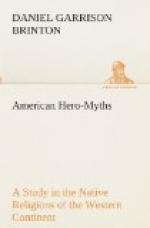It was said that on a certain occasion four bold young men determined to journey to the sun-rising and visit the great Ioskeha. They reached his cabin and found him there alone. He received them affably and they conversed pleasantly, but at a certain moment he bade them hide themselves for their life, as his grandmother was coming. They hastily concealed themselves, and immediately Ataensic entered. Her magic insight had warned her of the presence of guests, and she had assumed the form of a beautiful girl, dressed in gay raiment, her neck and arms resplendent with collars and bracelets of wampum. She inquired for the guests, but Ioskeha, anxious to save them, dissembled, and replied that he knew not what she meant. She went forth to search for them, when he called them forth from their hiding place and bade them flee, and thus they escaped.
It was said of Ioskeha that he acted the part of husband to his grandmother. In other words, the myth presents the germ of that conception which the priests of ancient Egypt endeavored to express when they taught that Osiris was “his own father and his own son,” that he was the “self-generating one,” even that he was “the father of his own mother.” These are grossly materialistic expressions, but they are perfectly clear to the student of mythology. They are meant to convey to the mind the self-renewing power of life in nature, which is exemplified in the sowing and the seeding, the winter and the summer, the dry and the rainy seasons, and especially the sunset and sunrise. They are echoes in the soul of man of the ceaseless rhythm in the operations of nature, and they become the only guarantors of his hopes for immortal life.[1]
[Footnote 1: Such epithets were common, in the Egyptian religion, to most of the gods of fertility. Amun, called in some of the inscriptions “the soul of Osiris,” derives his name from the root men, to impregnate, to beget. In the Karnak inscriptions he is also termed “the husband of his mother.” This, too, was the favorite appellation of Chem, who was a form of Horos. See Dr. C.P. Tiele, History of the Egyptian Religion, pp. 124, 146. 149, 150, etc.]
Let us look at the names in the myth before us, for confirmation of this. Ioskeha is in the Oneida dialect of the Iroquois an impersonal verbal form of the third person singular, and means literally, “it is about to grow white,” that is, to become light, to dawn. Ataensic is from the root aouen, water, and means literally, “she who is in the water."[1] Plainly expressed, the sense of the story is that the orb of light rises daily out of the boundless waters which are supposed to surround the land, preceded by the dawn, which fades away as soon as the sun has risen. Each day the sun disappears in these waters, to rise again from them the succeeding morning. As the approach of the sun causes the dawn, it was merely a gross way of stating this to say that the solar god was the father of his own mother, the husband of his grandmother.




